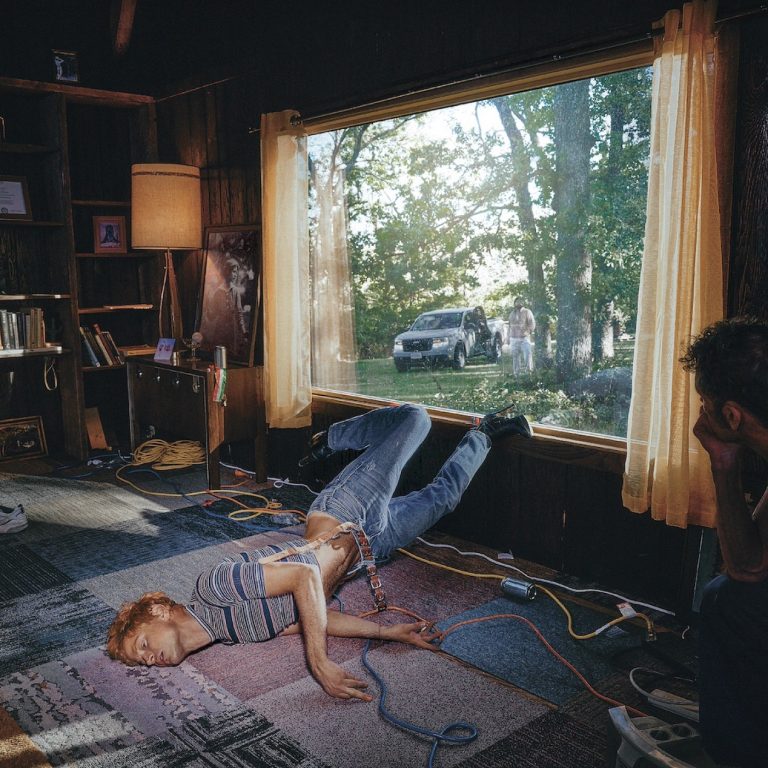As Perfume Genius, Michael Hadreas has long straddled the gap between pop and the avant-garde. Had he been around in the 1960s or 1970s, he would’ve probably been associated with the Warhol scene. With this in mind, it’s no surprise that he released an album such as 2022’s Ugly Season, a richly layered instrumental and textural foray with vocals that largely operated ambiently. Sure, before (and now after), Hadreas leaned toward hook-leaning songcraft, but in an alternate life his entire oeuvre sounds like Ugly Season. He invites a dozen people into a dusky room filled with all the instruments you can think of, crafting dream-like vignettes wrapped in waves of transcendent noise, jazz, and chamber art: Dada for the 21st Century. Paul Morrissey, or some iteration of him, captures the saga on grainy film.
But he keeps waking up in this world, and has done so again. That said, Glory, his fifth album with producer Blake Mills, is a bit looser, more spacious, illustrative of an artist who has learned to balance immersion with some degree of detachment. No worries, this is far from Hadreas’s “happy” album; it does, however, point to a more paradoxical life and aesthetic view. Suffering is real; all the same, Hadreas seems to be experiencing disappointment, anguish, even torment with a sprinkle of equanimity. All in all, Glory reestablishes Hadreas’s affinity for pop essentials while giving him a bit more room to express his alt-self (the one mentioned above).
On the album’s second cut, “No Front Teeth”, Aldous Harding’s gossamer vocal contrasts exquisitely with Hadreas’s huskier delivery. The vocal sections are punctuated by instrumental flares that bring to mind 2017’s No Shape and wouldn’t be out of place on a Mogwai project. The song was released as a single in February and is a standout track. Glory, however, really starts with track 3, as Hadreas dives into a mesmerizing vocal sequence, offering sublime performances that aspire to and often exceed the highs of 2020’s Set My Heart on Fire Immediately. Songs 3-10 of Glory unfurl seamlessly and complementarily, as Hadreas works with impressionistic lyrics, steamy melodies, and vocals that conjure longing, PTSD (personal and archetypal / processed and unprocessed), and, again, an understated equanimity.
The beats and instrumentation of “Clean Heart” invoke an alternately soothing and unsettling environment. Hadreas, meanwhile, is hesitative, languorous, his vocal flirting with the mystical. “Me & Angel” is built around a melancholy yet transportive melody. Images such as “the birds are all hanging on the line for you” and “there’s a halo that’ll always hold its shape” are relatively abstract when considered out of context. Channeled through Hadreas’s otherworldly voice, however, they’re energized, concretized, infused with meaning and emotional import.
“Left for Tomorrow”, bolstered by a supple bass part, is equally abstract yet rendered potently accessible via Hadreas’s stirring vocal. A feeling of loss is at the heart of this song, and Glory as a whole, yet Hadreas is at once enmeshed in the experience and outside it, as if he’s both trapped in and playing voyeur to his life, lost in the hallways of the past and dissecting his own memory like a researcher.
On the diaphanous “Capezio”, Hadreas pens some of his most cryptic lyrics and yet, the song is one of the most evocative pieces on the album. Adopting a higher-pitched vocal, he conveys fragility or precariousness, his voice framed by well-placed accents, light drum beats, and his own supporting vocals. “Dion” brims with minor-key arpeggios, tinkly synth accents, and metallic-sounding overlays. Hadreas alchemizes his elusive lyrics (“through a bitter cold sang a holy note”; “let the curtain close on Dion”) into a palpable manifesto on hurt and redemption, grief and communality, how we’re forever alone yet never alone. In this way, he integrates raw confessionalism and sober reportage.
“In a Row” is the album’s most (quietly) confrontive track. “Locked inside a moving car flopping in the trunk,” Hadreas moans, describing what might be an abduction. The image also stands as a metaphor for life’s unpredictability and the inevitability of death. The piece is composedly nightmarish, pointing to the banality of horror, to recast Hannah Arendt’s famous phrase. Framed by melodic synths and raspy drums, Hadreas’s vocal constitutes a plea and a protest, a prayer and a way of facing and perhaps overcoming the impulse to resign or give up. “Hanging Out” combines crunchy synth splashes, discordant synths, and roils that shrink and swell. Hadreas asserts an echoey commentary on desire, anger, and the way in which we’re never ultimately in control of our own thoughts and emotions, let alone our surroundings and other people.
With Glory, Hadreas continues to hone juxtapositions of heaviness and buoyancy, yoking the spacious and the claustrophobic. More specifically, he explores the dynamics of entanglement and removal, melding objectivity, magical realism, and a literary bent (Rae Armantrout’s “language poetry” comes to mind as does Charles Simic’s brand of surrealism). Hadreas is certainly a pop songwriter, though he filters his hooks through an epic orientation, viewing the micro or quotidian through mythic lens. Glory spotlights Hadreas as he mines this incarnation, its abundant beauty and messiness. He’s left a window to that alt-life open, however, and the winds from that realm gust through these songs.


